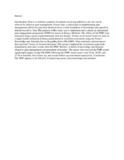| dc.description.abstract | Introduction: Pain is a common symptom for patients receiving palliative care, but can be relieved by effective pain management. Nurses play a critical part in implementing pain management effectively and must therefore have a solid foundation of knowledge and a positive attitude toward it. Aim: The purpose of this study was to implement and evaluate an educational pain management programme (PMP) for nurses in Kenya. Methods: The effects of the PMP were measured using a quasi-experimental pre-post test design. Twenty seven nurses from two units in a single health institution in Kenya participated in a baseline assessment using the Nurses' Knowledge and Attitudes Survey Regarding Pain (NKASRP). Nine randomly selected nurses then received 7 hours of focused education. This group completed the assessment again both immediately after and 2 weeks after the PMP. Results: A deficit in knowledge and attitudes related to pain management was prominent at baseline. The nurses who received the PMP scored significantly higher on the NKASRP following the PMP: mean scores were 18.44, 28.00, and 27.56 at baseline, first follow-up, and second follow-up assessment respectively. Conclusion: The PMP appears to be effective in improving nurses' pain knowledge and attitudes. | |

